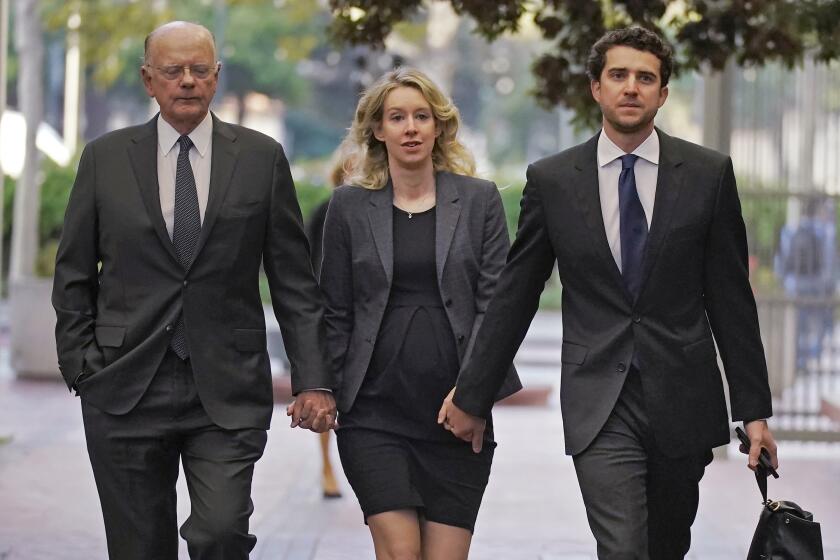Fed: Signs of a Slow, Sure Recovery
- Share via
WASHINGTON — Federal Reserve Chairman Alan Greenspan told Congress on Wednesday that he sees increasing signs the U.S. economy will soon emerge from recession, but warned that the recovery is likely to proceed at a sluggish pace.
Presenting the central bank’s semiannual assessment of the nation’s economic health, Greenspan said the economy appears “close to a turning point” that will signal the end of the nearly year-old recession.
The nation has largely recuperated from the financial shock of Sept. 11, Greenspan said, and there is little evidence that the collapse of Enron Corp. and other recent economic setbacks will cause the recovery to stall.
“Even a subdued recovery beginning soon would constitute a truly remarkable performance for the American economy,” Greenspan said in testimony before the House Financial Services Committee.
Greenspan’s prognosis, though characteristically cautious, added the Fed’s authoritative voice to a growing consensus of economists who say the recession of 2001 will turn out to be unusually shallow and short-lived.
If the tentative indications of a turnaround are confirmed, Greenspan said, “we will have experienced a significantly milder downturn than the long history of business cycles would have led us to expect.”
But the recovery may prove equally feeble, Greenspan suggested. The unemployment rate, currently 5.6%, probably will rise above 6% and stay there “for some time” before the job market begins to firm, he said. Economic growth will accelerate slowly, reaching an annual rate of 2.5% to 3% by the end of this year. The gradual expansion is unlikely to rekindle inflation, which the Fed expects to remain below 1.5%.
His carefully parsed predictions signaled that the Fed feels little pressure to begin raising interest rates to keep the economy from overheating. The central bank chopped short-term rates 11 times last year to combat a deepening business sector downturn and the shock of Sept. 11.
“There were absolutely no hints or signs in the commentary or the forecasts of the Federal Reserve that there would be any reason to raise interest rates this year,” said Allen Sinai, president of New York-based Decision Economics.
That message heartened bond traders, who had begun to worry that interest rate hikes were imminent. But its effect on the stock market was mixed, as initial relief gave way to anxiety about the implications of a long, drawn-out recovery. The Dow Jones industrial average ended the day at 10,127.58, up 12.32, and the S&P; 500 eked out a 0.51 gain to close at 1,109.89. But the Nasdaq composite index fell 14.98, finishing at 1,751.88.
“There was an expectation out there that Greenspan would have a more optimistic tone about the recovery,” said James W. Paulsen, chief investment officer with Wells Capital Management in Minneapolis.
Instead, “he came out with a report that said, yes, we’re out of recession, but it remains a little tenuous, and it might take a while.”
Newly released economic statistics added to the ambivalence. Only two days after sales of existing homes set a new record by soaring 16.2% in January, the Commerce Department said sales of new homes simultaneously plunged 14.8% to an annual rate of 823,000 units, the lowest level in 1 1/2 years.
At the same time, orders for big-ticket durable goods, from airplanes to appliances, jumped 2.6% last month. The increase was larger than expected, and suggested that the nation’s battered manufacturing sector was beginning to revive.
More evidence of a turnaround could come today, when the Commerce Department issues a revised estimate of the economy’s performance during the fourth quarter of 2000. The consensus view of economists is that last month’s initial estimate of a 0.2% annual growth rate will be bumped up to 1% or more.
If so, the recession will have caused only one contraction in gross domestic product: the 1.3% decline registered in the third quarter. The rule of thumb is that it takes two consecutive quarters of GDP shrinkage to constitute a recession.
Greenspan said it appears that Enron’s collapse will not slow the economic recovery, and could produce long-term benefits if it leads to reforms in corporate finances and regulatory oversight.
“I think after the fact, we will look back on this Enron episode as a period when we put our corporate governance back on track, which would not have happened without it, in my judgment,” he said.
While Greenspan’s relatively upbeat characterization of the economy seemed to reassure some members of the congressional panel, a few quarreled with his conclusions.
“I have a very difficult time recognizing the kind of rosy economy that you are portraying,” said Rep. Bernard Sanders (I-Vt.), citing the gradual disappearance of high-paying manufacturing jobs, the declining rate of health insurance coverage and the increasing cost of housing.
“That is not the economy that I see in Vermont, and not the economy, I think, that exists in many areas of this country.”
But Paulsen, the Wells Capital economist, gave Greenspan high marks for striking a careful balance between optimism and caution.
“He gives just enough critical commentary and scary thoughts to keep you sufficiently spooked, but at the same time just enough optimistic rhetoric to keep you believing in the future,” Paulsen said.
More to Read
Inside the business of entertainment
The Wide Shot brings you news, analysis and insights on everything from streaming wars to production — and what it all means for the future.
You may occasionally receive promotional content from the Los Angeles Times.










